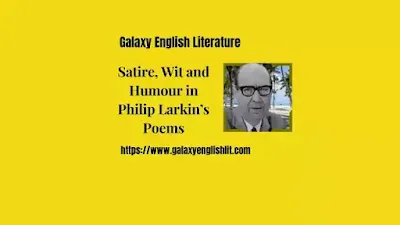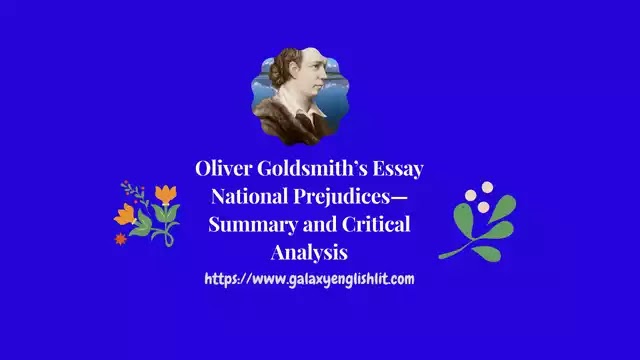Introduction:
Larkin's poems become attractive and charming because of satire, wit and humour. Larkin is able to find humour even in his dry subjects. He always exposes the evil defects and deceptions current in the modern English society but his sense of humour and wit relieves his poetry from boredom. Many of his poems are read simply for the element of satire and humour. Satire, wit and irony which are the redeeming features of Larkin's poetry, save his poetry from vapidity and dreariness. If T. S. Eliot can take poetry from the intractably unpoetic, Larkin is able to find humour in sterility and it testifies to his imaginative power as well as his knack of seeming things is a markedly different way.
 |
| Satire, Wit and Humour in Philip Larkin’s Poems |
Satire of Faith - Healers:
The poem entitled Faith - Healing is a satire on people who claim that they possess special spiritual powers that enable them to have direct contact with God and arrange relief for the suffering on earth. The way the evangelist is described has commercial tone about it. The picture of the preacher is most humorous:
“Slowly the woman file to where he stands upright in rimless
glasses, silver hair dark suit, white collar.”
Irony of Our Destiny Sweet Home:
The Poetry of Departure conveys the idea that it is an illusory thought to cherish, that some kind of alternative and at that a satisfactory and comforting alternative, can be found to the kind of conventional, humdrum life which we lead at present. Our approval is based on the fact that we naturally detest our home and that we instinctively revolt against the idea of getting penned there. It is absolutely true in the poet's case. The traditional concept of ‘sweet home’ receives a rude jold here. The poet generalises from his particular instance: “We all hate home”. The ironical paradox is that though home is considered a safe and cosily comfortable place catering to the needs of a person and protecting him from the elemental furies, strangely he finds it repugnant to his spirit of freedom. The paradox or irony lies in regarding his life in perfect order of which he must be proud, as boring and repulsive.
Satire on Modern Civilization:
Larkin's satire on modern civilization is quite pungent. In the poem Going and Going, he laughs at the modern commercial civilization. He does not like too much consumption and wastage of ordinary articles. His satire and irony gain a new edge, almost an Eliotian dimension, when he condemns the increasing demands made by technological civilization:
“Or age, simply? The crowd
Is young in the Mr. Cafe Their kids are screaming for more
More houses, more parking allowed,
More caravan rites, more pay.”
His Attack on Sex Motivated Society:
In the poem High Windows, the poet has drawn a picture of modern England specially the obscene behaviour of young men and young girls. The material world and the declining morals have made the young men and young girls of England quite weak in their sexual behaviour when the poet sees a young man and a young girl together, very close to each other, he gets the impression that they are engaged in the sexual act. Then he begins to think that the girl with a boy must have corrupt relations and that the girl must be taking birth control pills or wearing a diaphragm as a precaution against going into a family way or becoming pregnant. He looks at the present generation of young boys and young girls totally sex motivated which is not a real appraisal of the present society. In England there is freedom of and almost all marriages and love marriages but in the previous generations there was not much freedom of love.
Mocking at Marriage and Love:
In the poem “Self's the Man”, the poet says that Arnold married to earn and provide for his wife and kids. He married her to stop her getting away. The poet implies that the married man is no less selfish than the bachelor. Larkin's love poetry too bubbles with humour. In Wild Oars, he speaks of his meeting two girls in his work - spot. He took a fancy to one of them, wrote her four hundred letters, met her a number of times unknown to the clergy. But nothing fruitful happened. The poem Whitsun Weddings is an artistic piece full of irony and satire. In the poem, the poet makes satire the fashions of the young girls. The fathers of the girls also become the target of satire and the dresses that the fathers wear are also satirical. The poet presents a humorous picture of the members of a family and friends seeing off the newly married couple at the railway station. The children look bored, the well - pomaded young men grim without valid reason or purpose, friends of the bride satire at the departing trains and the uncles make smutty comments, as the newlyweds board the train. The fathers of the brides look as though they had never known success so huge and wholly farcical. The mothers seem to share the bridal secret “like a happy funeral.”
Satire on False Nature of Romanticising Advertisements:
In the poem entitled, Sunny Prestatyn, Larkin satirises the vulgar sexy advertisement of the modern times. A railway station poster promises pleasure to Prestatyn through the sensual image of a girl in swim - suit. The ironical anti - climax appears at the end with the poster replaced by a ‘Fight Cancer’ slogan which shatters the romantic illusion projected by the sexy poster. This poem is at once funny and horrid in its effect. It exposes the false nature of romanticising advertisements.





